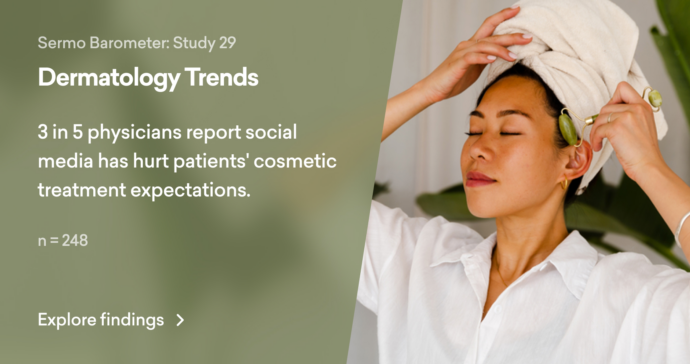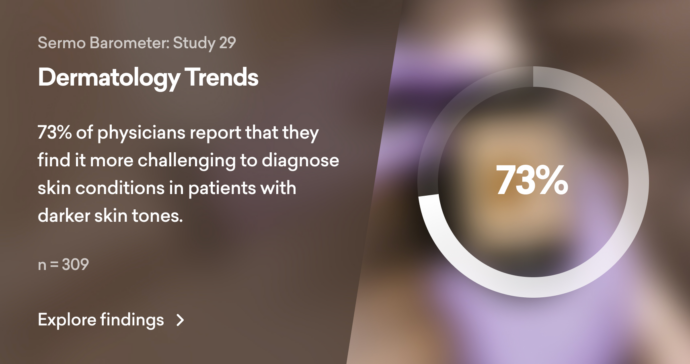Survey of 300+ Dermatology-focused Physicians Explores Sentiments Across Social Media, Diversity, Equity & Inclusion, Artificial Intelligence, and Treatment Innovations
New York, NY- A new survey from Sermo, a physician-first online community and leader in HCP insights, of 300+ Dermatology-focused physicians found there is significant apprehensiveness about cosmetic content they are seeing on consumer-facing social media as 74% of physicians agreed they have safety concerns about cosmetic trends they have seen or heard about on TikTok and other social platforms. 59% of the physicians surveyed feel that social media has hurt the effort to manage patients’ expectations with cosmetic treatments.

Practices are being inundated with patients bringing up cosmetic trends seen on social media with 80% of surveyed dermatology-focused physicians reporting that their patients bring up these trends frequently to occasionally and only 2% of physicians reported that patients have never brought up a trending social media cosmetic treatment in their practice.
“Dermatologists feel they are in a no-win battle against unrealistic expectations of cosmetic treatment capabilities being presented on consumer-facing social media channels,” says Dr. Roya Azadi, Medical Director at Concord Clinic and Elite Medical + Longevity and Sermo Medical Advisory Board Member. “While some consumer-focused social skincare content can be informative, some of what is being seen on TikTok is not from a professional perspective and some of the procedures being presented are actually harmful to the patient.”
Diversity, Equity, and Inclusion (DEI) Has a Long Way to Go in the Dermatology Field:
Dermatology-focused physicians agree that more needs to be done within the medical community to assist in diagnosing patients of color as 73% of those surveyed reported that they find it more challenging to diagnose skin conditions in patients with darker skin tones. This issue is of significant urgency as 67% of those surveyed reported that they see more patients of color in their practice coming in with later-stage conditions due to delayed detection.

The survey of dermatology-focused physicians also indicated that more needs to be more in practices to address the unique needs of the LGBTQ+ community. Only half (52%) of those surveyed reported that their practices have implemented training dedicated to the unique medical needs of this community. This lack of training could be of particular concern to patients at high risk for skin-related health concerns due to sun-protection behaviors, side effects of gender-affirming hormone therapy and procedures, and skin manifestations of sexually transmitted diseases.
Other Key Survey Findings:
Excitement is High for Dermatology AI & Digital Tools, But Current Trust in Tools is Low:
- 77% of surveyed dermatology-focused physicians reported that they had used an app, digital tool, or online image gallery, yet 66% of those surveyed reported that they have concerns about the accuracy of the results. Accuracy concerns were even higher among survey participants who practice dermatological surgery with 85% expressing concern.
- Other concerns about these digital tools included security (43%), the ability to use them on patients with darker skin tones (40%), and the tools having manufacturer basis (40%).
- Until trust in AI-driven results is established, the jury is still out on where AI can best serve dermatologists in their practices. When asked how they see AI as best-supporting dermatology, there was no clear winner with the top four answers as condition screening (17%), image analysis to support tele-dermatology (16%), disease severity and staging (14%), and clinical assessment (14%).
Excitement is High for New Treatment Innovations:
- When asked what cosmetic dermatology advancements dermatology-focused physicians were most excited about, they selected bio-sim/regen fillers (43%), long-acting neurotoxins (long-lasting injectables) (41%) and laser treatments for darker skin tones (38%) within the top three.
- Dermatologists’ enthusiasm is highest for both oral and topical JAK-inhibitors. More than half (58% for oral, 56% for topical) of surveyed dermatologists indicated this is the atopic dermatitis innovation that they are most looking forward to. Enthusiasm for JAK-inhibitors was followed by IL-13 antagonists at 40%.
This survey was fielded as the 29th edition of Sermo’s ongoing Barometer survey. The survey included more than 300 global physicians ranging from dermatologists, dermatology-focused surgeons, and primary care physicians who treat medical and cosmetic dermatology conditions who were surveyed between April 5-10, 2023. To explore more findings, visit app.sermo.com/barometer.
About Sermo:
Sermo is the largest global healthcare research company and the most trusted physician engagement platform. Sermo engages with more than 1.3 million HCPs across 150 countries and has reach into the U.S. Payer market that now exceeds 230M commercial lives covered.
For over 20 years, Sermo has been turning physician experience, expertise, and observations into actionable business insights that benefit pharmaceutical companies, healthcare partners, and the medical community at large. Sermo offers on-demand access to physicians via a proprietary health-tech ecosystem to gain targeted HCP insights that inform strategic decisioning in real-time. To learn more, visit www.sermo.com.
Media Contact:
Allyson Noonan
AN Communications
(858)245-7256